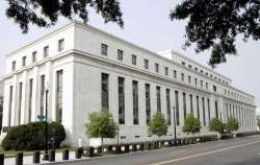MercoPress. South Atlantic News Agency
Stories for November 25th 2008
-
Tuesday, November 25th 2008 - 20:00 UTC
Markets world-wide soar on Citicorp rescue plan effect

The Citicorp rescue effect which had markets soaring in Europe and United States also impacted in Latinamerica. Brazil's Bovespa was up 9.8% on Monday recovering most last week's losses and the Mexican IPC rose 7%.
-
Tuesday, November 25th 2008 - 20:00 UTC
Medvedev in Latam visit to revive “privileged” ties

Russia is seeking to revive “privileged” ties with Latin America, which had been neglected after the collapse of the Soviet Union, Russian President Dmitry Medvedev said Monday on leaving Peru.
-
Tuesday, November 25th 2008 - 20:00 UTC
Uruguay/Argentina ready for next diplomatic clash

Chile's Foreign Affairs minister Alejandro Foxley said that former president Nestor Kirchner remains the leading candidate to become Secretary General of the Union of South American Nations, Unasur, although admitting a consensus must be reached among country members.
-
Tuesday, November 25th 2008 - 20:00 UTC
Goat cheese sparks listeriosis scare in Santiago de Chile

A listeriosis scare broke out in Santiago del Chile when food sanitary officials ordered the withdrawal of a certain type and brand of cheese and the manufacturer sent a release to the different supermarket chains claiming that the decision was “only preventive”.
-
Tuesday, November 25th 2008 - 20:00 UTC
Fed to inject another 800 b. to unfreeze credit market

The US Federal Reserve is to inject another 800 billion US dollars into the US economy in a further effort to stabilise the financial system. US Treasury Secretary Henry Paulson said the stimulus package aimed to make more lending available to consumers.
-
Tuesday, November 25th 2008 - 20:00 UTC
Obama readies stimulus plan and budget reform
President-elect Barack Obama has outlined more details of his plans to stimulate the ailing US economy, at the same time as making cuts to the budget. He said budget reform was “imperative” and that the nation could not “sustain a system that bleeds billions of taxpayer dollars” on unneeded projects.
-
Tuesday, November 25th 2008 - 20:00 UTC
China GDP growth in 2009 “around 7.5%” says World Bank
The World Bank forecasts that China's GDP growth rate will be around 7.5% in 2009, down from 9.4% in 2008 and 11.9% in 2007.China's export growth is likely to be low in 2009 – around 3.5% (in real terms) compared to 11% in 2008.
-
Tuesday, November 25th 2008 - 20:00 UTC
OECD forecasts unemployment peaks in next two years

The number of unemployed in OECD countries is expected to increase by about 8 million people over the next two years as the most serious recession since the early 1980s takes its toll on economic activity, according to the latest OECD Economic Outlook released on Tuesday.
